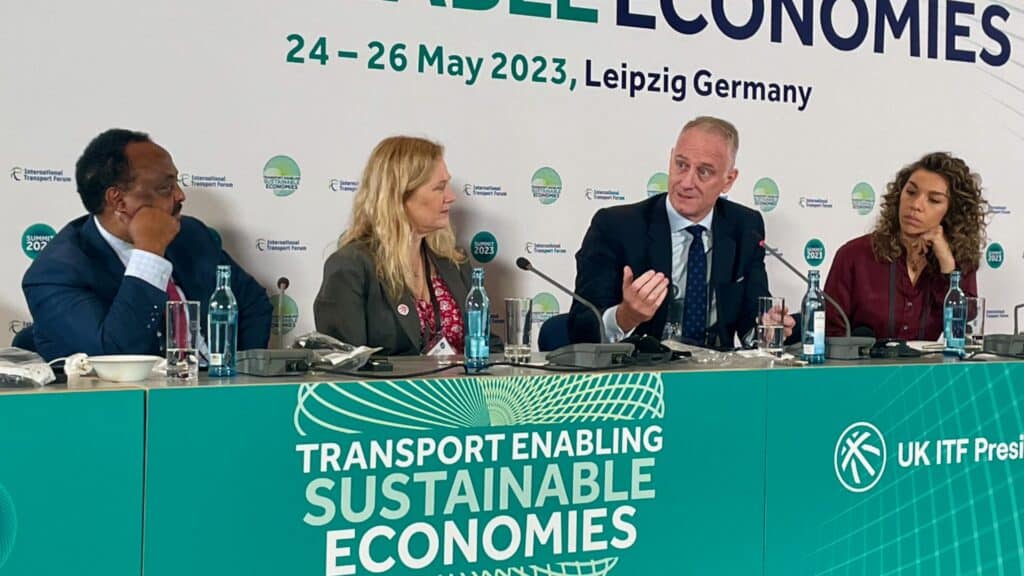
With a prototype database up and running to demonstrate the vision, an effective organisational structure and initial seed funding from Germany, the UK and the US, the Transport Data Commons is ready to move into full operation and attract more funding in its second year. 30 organisations support the idea of open and robust data collection and management to enable transport decarbonisation and sustainable mobility.
A year ago, the idea for the Transport Data Commons was born at a co-creation workshop on the sidelines of the International Transport Forum Summit in Leipzig, Germany. Publicly available transport data remains, at best, difficult to access in many fragmented databases. Sometimes transport data exists, but it is not openly accessible. Often it is not collected regularly, or it is difficult to compare and aggregate because it is not harmonised. This is the case across countries and is particularly acute in low- and middle-income countries.
As a result, many international development organizations with their partner governments step in to collect data for a given objective or transport sub-sector. While this is a wonderful job that supports policymaking and research; it leads to a variety of indicators, websites, PDF documents from which it is difficult to cross-check data and compile consistent time series. It also implies extensive resources that are spent on extracting, adjusting, checking and using data. Often, efforts are duplicated.
The people behind the Transport Data Commons want to develop a common data platform where all participating organisations can both contribute and extract data on the transport-climate nexus. It includes three elements that differentiate it from other ongoing efforts:
While modelers and researchers could save a lot of time, as data collection and cleansing is extremely time consuming, the participating development organizations and donors could save money in the mid-term. This is why partners extend a warm invitation to join this collective endeavour to like-minded entities and individuals.
In the medium term, the Transport Data Commons will reduce data gaps and improve the quality of modelling, evaluation, impact assessment and reporting of transport projects. It will enable more effective support to low- and middle-income countries in their efforts to increase climate ambition. Donors, national and local governments, researchers, data analysts and civil society will all benefit from more accessible data.
In a nutshell, those who want to raise climate ambition need better transport data. So finally, the climate will benefit from Transport Data Commons as more ambitious climate actions is based on sound analysis.
Seed funding from Germany’s GIZ and the UK’s Climate Compatible Growth Programme has supported the prototyping efforts. UNECE is providing the infrastructure to host the database. To accelerate implementation, the partners have established three working groups over the last 12 months on (i) strategic issues, (ii) data architecture and (ii) user perspectives. All partners have been meeting regularly as a full group. The group is now refining the prototype database, establishing a formal organisational structure and identifying funding.
You may want to take a look at the prototype and get involved, whether by providing comments and feedback, data, or even considering supporting the initiative with in-kind or financial contributions.
Take a look at: www.transport-data.org.

Please have a look at our resources on YouTube to learn more about the Transport Data Commons:
If you are interested to learn more and share your feedback, please contact the current project managers, Ms Kirsten Orschulok and or Ms. Verena Knöll at GIZ. You can meet Verena at the International Symposium on Transportation Data & Modelling (ISTDM2023) organised by the Joint Research Centre in Isrpa, Italy on 19 and 20 June.
 Panelists of World Bank, FCDO, CAF and Asian Development Bank at Prototype Launch Event in Leipzig ©Daniel Bongardt
Panelists of World Bank, FCDO, CAF and Asian Development Bank at Prototype Launch Event in Leipzig ©Daniel Bongardt

Daniel Bongardt
daniel.bongardt@giz.de
Visit profile

Kirsten Orschulok
kirsten.orschulok@giz.de

Verena Knöll
verena.knoell@giz.de
Visit profile